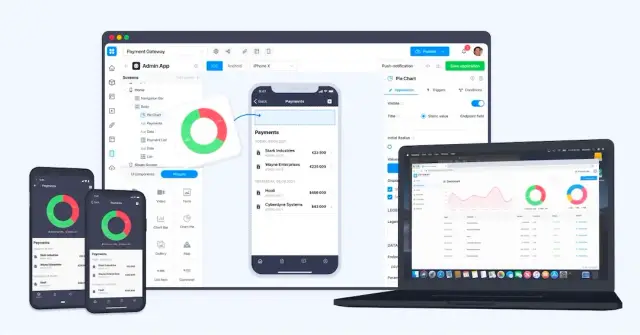ERP in the Post-COVID World
Discover how ERP systems have evolved in the post-COVID world. Learn about the challenges and trends shaping the industry, and explore the opportunities for businesses to thrive.

Introduction to ERP Systems in the Post-COVID World
The COVID-19 pandemic has significantly impacted the global economy and the way businesses operate. As a result, enterprise resource planning (ERP) systems have had to adapt to new challenges and demands that emerged during this tumultuous period. ERP solutions are designed to integrate various business processes (such as finance, human resources, supply chain, and customer relationship management) into a unified software platform, enabling organizations to streamline their operations, reduce complexity, and improve visibility into their performance.
In the post-COVID world, several factors have made ERP systems even more critical for businesses. Remote work became the norm, digital transformation accelerated, and companies faced increased pressure to optimize their supply chains and inventory management. The ERP sphere has evolved rapidly in response to these challenges, with new trends and innovations driving change within the industry.
Challenges Faced by ERP Systems during the Pandemic
The COVID-19 pandemic has forced organizations to reassess their ERP systems and identify areas for improvement. Some of the key challenges that arose during this period include:
- Remote work: With the sudden shift to remote work, businesses had to embrace digital tools and collaboration platforms to maintain productivity. Traditional on-premise ERP systems may not have provided the necessary flexibility and accessibility required for remote teams, leading companies to explore cloud-based and mobile-enabled solutions.
- Accelerated digital transformation: As companies rushed to adapt to the new normal, the need for digital transformation became unavoidable. ERP systems played a central role in enabling businesses to modernize their processes, requiring updates and integrations with other technologies to keep pace with this transformation.
- Supply chain disruptions: The pandemic exposed vulnerabilities in global supply chains, making it essential for companies to have powerful and agile ERP systems capable of handling unexpected disruptions. New strategies, such as reshoring and nearshoring, required ERP systems to adapt quickly to changing supplier networks and demand patterns.
- Financial stress: The economic impact of the pandemic led to increased financial pressure on organizations. As a result, businesses had to scrutinize their ERP systems, ensuring efficient resource allocation and cost control. Adopting flexible and scalable ERP solutions became a priority as companies sought to optimize operations in an uncertain environment.

Trends Shaping the Evolution of ERP Systems
The challenges posed by the COVID-19 pandemic have been a driving force behind several key trends in the ERP industry. These trends are shaping the future of ERP systems, enabling businesses to overcome obstacles and exploit new opportunities:
- Cloud-based solutions: Cloud-based ERP solutions have gained significant traction during the pandemic, as they offer flexibility, scalability, and remote accessibility. They enable teams to access data and collaborate from anywhere, making them an increasingly popular choice for modern, distributed workforces.
- Artificial intelligence and machine learning: AI and machine learning are rapidly becoming integral parts of ERP systems. By harnessing vast amounts of data and analyzing patterns, these technologies provide valuable insights and predictive capabilities that can help businesses make informed decisions and improve processes. Furthermore, AI-driven automation can streamline time-consuming tasks, delivering greater efficiency and cost savings.
- Mobile accessibility: As remote work continues to permeate the post-COVID world, mobile accessibility has become a crucial component of ERP systems. By enabling employees to access data and perform tasks on their mobile devices, companies can ensure seamless collaboration and communication — regardless of workers' location.
- Industry-specific solutions: Businesses increasingly demand industry-specific ERP solutions that cater to their unique requirements and challenges. Customized ERP systems provide tailored functionality and insights, empowering organizations to optimize their operations and achieve competitive advantage.
- Integration with other business systems: In order to thrive in the post-COVID world, businesses need to leverage the full potential of their technology stack. Seamless integration between ERP systems and other tools, such as CRM, HR, and project management solutions, is crucial for maximizing efficiency and aligning processes across the organization. Companies are increasingly seeking ERP systems that foster interoperability and can easily connect with other crucial systems.
Opportunities for ERP Solutions in the Post-COVID World
The post-COVID world presents numerous opportunities for ERP solutions to help businesses thrive in an ever-changing environment. As organizations continue to embrace digital transformation and remote work, the demand for efficient, integrated, and data-driven solutions is higher than ever before. Here are some key opportunities for ERP solutions in the post-COVID world:
Enhancing remote collaboration and communication
As remote work becomes more widespread, ERP solutions tailored for dispersed teams can bridge the gap between geographically scattered employees. By providing easy access to real-time, centralized data and collaboration tools, ERP systems can enable employees to stay connected and make informed decisions, even when working remotely. Additionally, the integration of communication and collaboration tools can further streamline workflows and boost productivity.
Better decision-making through data-driven insights
Data-driven insights can help businesses identify trends, optimize processes, and make better strategic decisions, ultimately improving their competitiveness and resilience. Advanced ERP solutions can leverage artificial intelligence (AI) and machine learning techniques to analyze large amounts of data, detect anomalies, and provide critical insights for accurate decision-making.
Increased automation and optimization
The automation of routine tasks and workflows is a key benefit of many ERP systems. In the post-COVID world, businesses are looking for ways to improve efficiency, reduce operational costs, and increase agility. ERP solutions that incorporate advanced technologies like AI, robotic process automation (RPA), and the Internet of Things (IoT) can help organizations achieve their automation goals while maintaining a high level of accuracy and control.
Strengthening supply chain and inventory management
During the pandemic, supply chain disruptions revealed the importance of resilient and adaptable supply chain solutions. Post-COVID ERP systems should offer enhanced features for supply chain and inventory management, enabling businesses to track and monitor real-time inventory levels, reduce waste, and quickly identify and respond to any potential bottlenecks or disruptions.
Greater focus on industry-specific ERP solutions
Industry-specific ERP solutions can provide businesses with tailored features designed to meet the unique needs and demands of their sector. Post-COVID ERP systems should emphasize customization to deliver targeted functionality, catering to the specific requirements of various industries.
How AppMaster Can Help You Build Custom ERP Systems
AppMaster is a powerful no-code platform that can help businesses create custom ERP systems tailored to their specific needs and requirements, while reducing development time and costs. The AppMaster platform offers numerous advantages for businesses looking to develop their own ERP system:
Accelerate development with no-code
The AppMasterno-code platform enables rapid development, allowing businesses to quickly create and deploy ERP solutions. Organizations can save time and resources typically spent on hiring developers or external vendors by utilizing AppMaster's user-friendly interface to design, test, and deploy their ERP applications.

Develop tailored, industry-specific ERP solutions
AppMaster enables the development of industry-specific ERP solutions by providing a flexible platform that can be easily customized to meet the unique needs and requirements of individual businesses. With AppMaster, organizations can create custom modules, workflows, and integrations to cater to the specific demands of their industry.
Reduced costs and increased control
Building a custom ERP system with AppMaster allows businesses to significantly reduce development costs compared to traditional coding methods. Additionally, utilizing the AppMaster platform provides more control over customizations, allowing businesses to fine-tune their ERP system to their specific requirements without the need for extensive coding knowledge.
Elimination of technical debt with regeneration
AppMaster eliminates technical debt by regenerating applications from scratch every time requirements are modified. This ensures that the resulting software remains up-to-date, efficient, and free of any lingering issues that can arise from outdated or unused code.
Conclusion
The post-COVID world presents numerous challenges and opportunities for businesses, and ERP systems play a critical role in helping organizations adapt to the new normal. By embracing digital transformation and leveraging advanced technologies, ERP solutions can become better equipped to handle remote collaboration, improved decision-making, increased automation, and enhanced supply chain management.
With AppMaster's no-code platform, businesses can quickly and cost-effectively create custom, industry-specific ERP systems that address their unique needs, fueling growth and resilience in the post-COVID world. AppMaster provides a powerful and flexible solution that can help your organization stay ahead in an ever-changing business industry.
FAQ
An ERP (Enterprise Resource Planning) system is a software solution designed to integrate various business processes and functions, such as finance, human resources, supply chain, and customer relationship management, into a unified platform.
The COVID-19 pandemic disrupted traditional ERP systems by accelerating digital transformation, pushing companies towards remote work, and demanding better supply chain and inventory management.
Major trends shaping the evolution of ERP systems include cloud-based solutions, artificial intelligence, mobile accessibility, industry-specific solutions, and integration with other business systems.
Post-COVID opportunities for ERP solutions include better remote collaboration, improved decision-making through data-driven insights, increased automation, and more resilience to future disruptions.
AppMaster can help with building custom ERP systems by providing a powerful no-code platform that enables businesses to create backend, web, and mobile applications quickly and cost-effectively.
Using a no-code platform like AppMaster offers several advantages, including accelerating development time, reducing costs, providing more control over customizations, and eliminating technical debt through the regeneration process.
Yes, AppMaster's no-code platform allows for the development of industry-specific ERP solutions, tailored to meet the unique needs and requirements of individual businesses.
Businesses of all sizes and industries can benefit from integrating ERP systems, especially those dealing with complex supply chains, large amounts of data, and needing improved coordination and communication between different departments.





